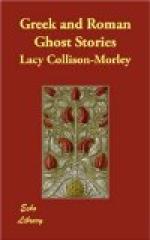Another noticeable difference is that apparitions in most well-authenticated modern ghost stories are of a comforting character, whereas those in the ancient world are nearly all the reverse. This difference we may attribute to the entire change in the aspect of the future life which we owe to modern Christianity. As we have seen, there was little that was comforting in the life after death as conceived by the old pagan religions, while in medieval times the horrors of hell were painted in the most lurid colours, and were emphasized more than the joys of heaven.
FOOTNOTES:
[Footnote 25: Cic., Murena, 27.]
[Footnote 26: Ep., i. 18.]
[Footnote 27: Ibid., 3. 5. 4.]
[Footnote 28: Chap. II]
[Footnote 29: Dio Cass., Domitian, 9.]
III
STORIES OF HAUNTING
In a letter to Sura[30] the younger Pliny gives us what may be taken as a prototype of all later haunted-house stories. At one time in Athens there was a roomy old house where nobody could be induced to live. In the dead of night the sound of clanking chains would be heard, distant at first, proceeding doubtless from the garden behind or the inner court of the house, then gradually drawing nearer and nearer, till at last there appeared the figure of an old man with a long beard, thin and emaciated, with chains on his hands and feet. The house was finally abandoned, and advertised to be let or sold at an absurdly low price. The philosopher Athenodorus read the notice on his arrival in Athens, but the smallness of the sum asked aroused his suspicions. However, as soon as he heard the story he took the house. He had his bed placed in the front court, close to the main door, dismissed his slaves, and prepared to pass the night there, reading and writing, in order to prevent his thoughts from wandering to the ghost. He worked on for some time without anything happening; but at last the clanking of chains was heard in the distance. Athenodorus did not raise his eyes or stop his work, but kept his attention fixed and listened. The sounds gradually drew nearer, and finally entered the room where he was sitting. Then he turned round and saw the apparition. It beckoned him to follow, but he signed to it to wait and went on with his work. Not till it came and clanked its




